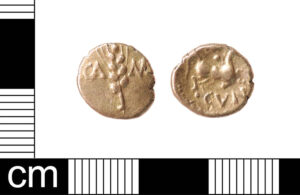
A British detectorist is facing a very severe sentence after Chelmsford Magistrates’ Court in Essex found him guilty of various offenses. Even though metal detecting is a legal hobby in the United Kingdom, detectorists have to abide by strict requirements and legal regulations. Shane Wood violated pretty much every rule there is.
Gold Coins: Any Detectorist’s Dream
It all started when the dream of any detectorist came true, a scene reminiscent of the finale of the popular British series “Detectorists”: 62-year-old Shane Wood, who is said to be an avid birdwatcher, saw a buzzard feather fall down during a walk in September 2020. Next to the feather, there was a golden shimmer: a gold coin! He rushed home, fetched his metal detector and found a treasure. Shane discovered what was “likely to be if not the largest then the second-largest such find in Britain”, as Prosecutor Ashley Petchey is quoted: 933 Celtic gold staters.
Detectorist Rule Number 1: Ask the Landowner!
However, this is where the problems start. It seems like the situation was too much for Shane, who was not serious about metal detecting but did it just for fun alongside other hobbies. He gave the treasure to a man he believed to be the landowner. However, this man only used the land for his horses. Mistake number 1.
Actually, it was already mistake number 2: the judge found that Shane was not even allowed to search the territory with a metal detector in the first place. If you want to do something like that, you need to ask for permission from the landowner. Before doing it!

Memento or Theft?
Mistake number 2 or rather 3: Shane did not hand over everything, he kept 23 coins “as a memento”. According to the prosecutor, these coins – 22 staters and one quarter stater – are worth between £9,850 and £12,350.
The law requires a treasure to be notified to the coroner within 14 days. Moreover, Shane should have also contacted a Find Liaison Officer, i.e. an expert archaeologist to look at the find situation. The man Shane gave the coins to contacted the landowner, who in turn notified the coroner.
Ignorance of the Law is no Excuse
And how did the theft come to light? Shane considered the coins on his fridge to be so decorative that he thought he could probably keep a few of them. Of course, the media rang Shane’s doorbell once the treasure find was reported. And in an interview photo, a gold coin was clearly visible in the kitchen. Shortly thereafter, the police were at his doorstep and seized 23 coins. Later Shane was to admit that he did realize that he was not allowed to keep the gold coins just like that.
Metal Detecting Is a Serious Business
In April 2021, the story came to a rather brutal end. Shane was not only sentenced to 18 months of community work amounting to 200 hours. Usually, the honest finder is entitled to receive 50 percent of the proceeds from selling the treasure. In this case, that would have been a considerable amount as the total value of the gold hoard was estimated to be in the mid-six-figure range. However, there was no talk of this in the media reports.
Above all, the judge demanded Shane’s metal detector to be destroyed as punishment! The details as to how that is to happen have not been disclosed. Will a bulldozer drive over it? Or will the defendant have to carry out the punishment himself with a sledgehammer …? This somewhat archaic sentence would certainly make the heart of any true detectorist bleed much more than any fine – just think of Andy and Lance from “Detectorists”. In the series, they have a very hard time lending their beloved detector to someone else for five minutes.
However, Shane is hardly a true detectorist. But the judge only granted this as a mitigating factor to Shane’s girlfriend. Regarding Shane, he made clear: “Detectorists should go about their business in the correct way.” The theft of artefacts is “not just from the landowner or the Crown, but it’s depriving the public of interesting archaeological information. It’s important archaeologists can get in quickly and understand the site fully so a sense of context is discovered.”
In this regard, the judge made an example of Shane. After all, the British system of the Portable Antiquities Scheme only works if detectorists take their hobby seriously. Those who are just looking for something fun to do should consider something else. Maybe it is a good thing that Shane can no longer get his hands on his metal detector. Had it simply been sold to a shop down the street, Shane might have bought it again for emotional reasons – that’s also something we are familiar with from “Detectorists”…
Several British media covered the case, for example the East Anglian Daily Times.
The amount of treasures discovered in British gardens in 2020 is impressive…
In 2020, many new records were set regarding treasure finds.
The British Museum recently published their latest report on recent treasure finds.
Cultural Property News breaks down the legal situation of the case.
Here you can read more on the topic, in case you actually did not watch “Detectorists”.




